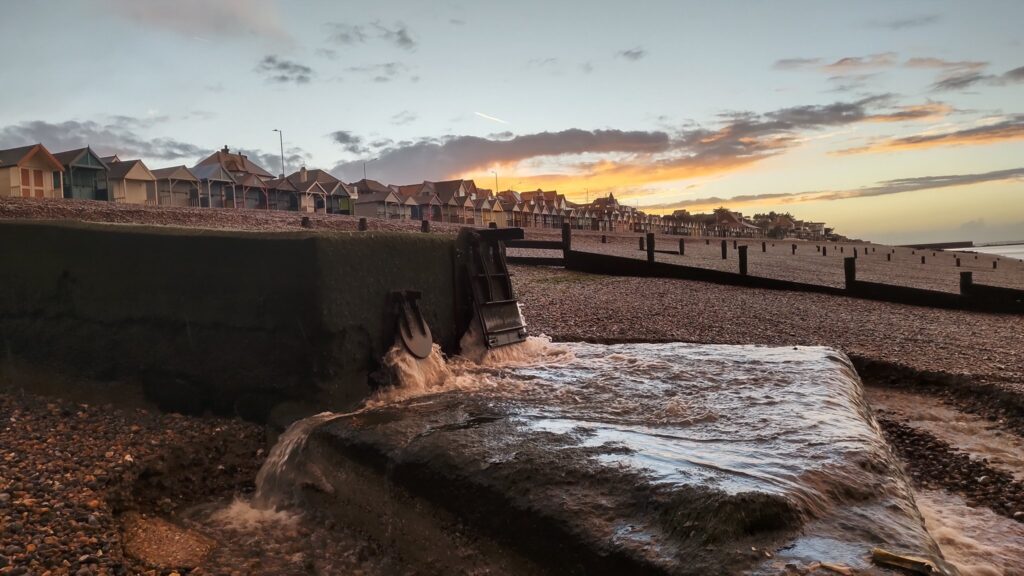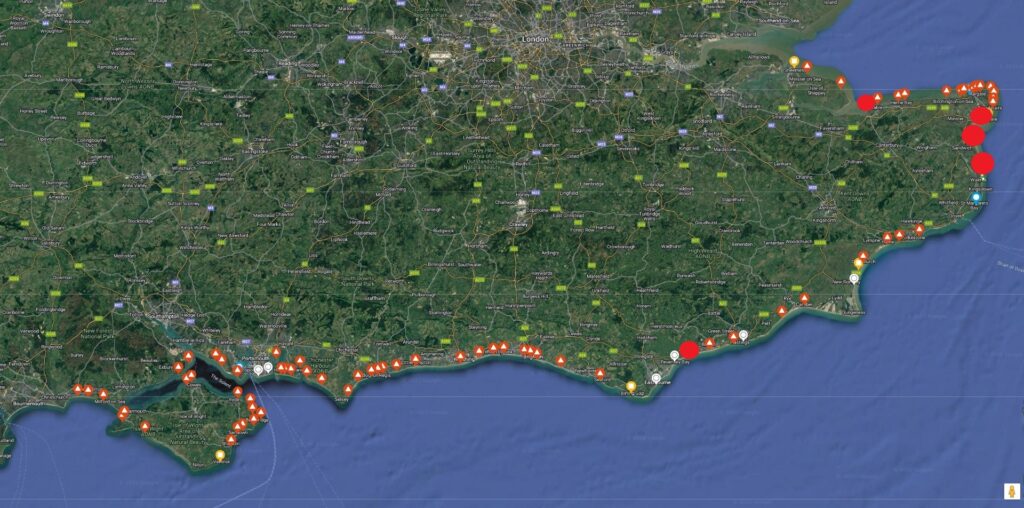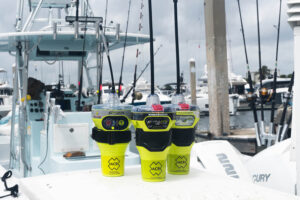Southern Water dumps ‘5 months’ of sewage in 8 days
 Sewage outflow at Herne Bay on 8 November Image courtesy of Twitter/@MetJam_
Sewage outflow at Herne Bay on 8 November Image courtesy of Twitter/@MetJam_
Almost every designated bathing beach on the UK’s southeast coast is at risk from an “unprecedented” level of sewage discharge, environmental campaigners have said.
Monitoring of data published by Southern Water this month reveals the scale of storm overflow sewage discharges into coastal bathing waters. Southern Water discharged sewage into UK water for more than 3,700 hours at 83 bathing beaches in the first eight days of November alone (the equivalent of five months’ worth), analysis by non-profit campaign group SOS Whitstable shows. This represents over 493 individual releases.
Southern Water has blamed the releases on stormy weather, experienced during the first week of the month, which overwhelmed drains.
The beach at Pagham, near Bognor Regis, is one of the worst-affected beaches. Data highlighted by SOS Whitstable shows raw sewage was discharged into the sea for over 275 hours in the first 10 days of November, during two separate and continuous releases.
Stokes Bay on the Solent and Chichester Harbour at Hayling Island are also badly impacted, showing 173 and 174 hours of discharge, respectively, during the same period.
Meanwhile, on the Isle of Wight, Cowes had seen 117 hours of sewage and wastewater discharge within the first 10 days of November, in addition to over 224 hours in Ryde and over 65 hours at Sandown Beach.
Throughout 2021, Southern discharged raw sewage into waterways for more than 160,000 hours, according to Environment Agency data. The average spill lasted 8.4 hours.
British water firms have been criticised this year for the number of pollution incidents taking place under their watch. In August, beachgoers were told to keep out of the water across dozens of beaches in the UK, after untreated sewage was pumped into the sea following storms.
In October, MIN reported on the outrage generated by a video of sewage overflow being pumped into clear blue waters at a picturesque public beach in Cornwall.
This Saturday (12 November), protestors also gathered at Riverside Park in Southampton — some wearing poo costumes — to call on Southern Water to stop discharging sewage in the River Itchen.

“This is environmental vandalism and most of these discharges are still ongoing as we speak. It fills us with foreboding for the coming winter months,” Ed Acteson of SOS Whitstable told the Guardian.
Speaking to the BBC, Acteson says sewage was dumped in or near 83 bathing areas in Dorset, Hampshire, the Isle of Wight, Kent and Sussex. Only Westbrook Bay in Margate, St Margaret’s Bay near Dover and Stoke Lake in Gosport had not had any discharges in November, he adds.
Nick Mill, head of head of Southern Water’s clean rivers and seas taskforce, insists the releases are necessary to avoid flooding.
“To protect homes, schools and businesses from flooding, storm overflows act as a release value to relieve the pressure – allowing excess flows to bypass treatment and enter rivers and the sea,” he told the Guardian in response to SOS Whitstable’s campaign. “These discharges are heavily diluted, typically being 95 per cent rainwater, and are permitted by the Environment Agency. However, we know that these are not acceptable and this is why we are working hard to reduce them across our region.”
Southern Water has recently changed how it alerts the public to pollution, via its Beachbuoy alert map. Southern now filters releases to decide if they are ‘impacting’ or ‘non-impacting’, with only ‘impacting’ releases listed as red alerts on the map.
The decision is based upon factors such as length of sewage outflow, tides and distance from the shore.
Speaking to the BBC, Southern Water said it “accepted the campaign group’s figures” — which were taken from its own website — and said storm overflows are made of up to 95 per cent rainwater.
The firm’s Chief Customer Officer, Katy Taylor, adds: “We’ve experienced unprecedented stormy weather and flash flooding in early November, with more rain in the last week than we’d normally expect to see for the whole of the month.
“We are investing £2bn across five years — much of which will reduce the use of storm overflows, increase storage capacity and find ways to divert rain back to the environment naturally.”
South-east England experienced around 90 per cent of its average November rainfall in the first 10 days of the month, according to the Met Office.
SOS Whitstable has launched a petition to nationalise the water industry, and put an end to private companies profiting from this national resource. It is approaching 200,000 signatures, making it among the most successful petitions on the Change.org platform.
“This is an absolutely unprecedented level of sewage pollution,” Acteson tells the BBC. “Legally they are allowed to do this in exceptional circumstances but this is not morally acceptable.”











